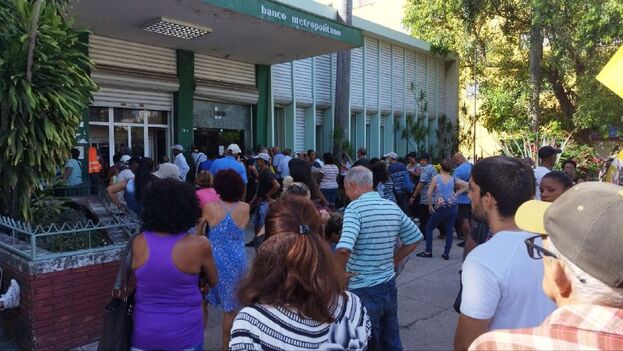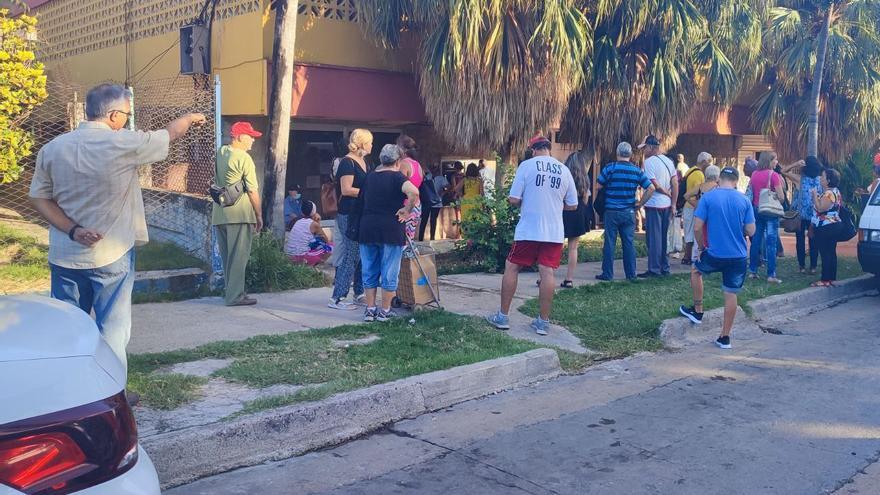
![]() 14ymedio, Juan Diego Rodríguez, Havana, August 1, 2023 — The line at the Banco Metropolitano ATM on Marino y Conill street, in Nuevo Vedado, was abuzz this Tuesday. To the number of elderly people in the neighborhood, who were waiting to be able to extract their pension payment, were added neighbors who came from Calzada del Cerro and 26th Street because the ATMs in those areas did not have cash.
14ymedio, Juan Diego Rodríguez, Havana, August 1, 2023 — The line at the Banco Metropolitano ATM on Marino y Conill street, in Nuevo Vedado, was abuzz this Tuesday. To the number of elderly people in the neighborhood, who were waiting to be able to extract their pension payment, were added neighbors who came from Calzada del Cerro and 26th Street because the ATMs in those areas did not have cash.
The situation was not exclusive to those parts of Havana. On Línea in El Vedado the appearance of the line at the ATM was more like a mob than an orderly line. The fight for cash reaches higher levels every day in a country where electronic transactions are still scarce, both due to the size of the underground economy and the lack of online connectivity, as well as to the population’s rejection of having their movements monitored.
“Cash is what you buy food with and buy everything you need. When you go to a small business to buy a bag of milk, if it’s worth 2,000 pesos you have to pay it in cash, because the seller doesn’t want you to do it with transfer,” laments a woman from Havana in line at the branch. “If you are going to eat in a restaurant, the same thing happens. If you are going to take a private taxi, because transportation is terrible and you have to resort to private ones, you have to pay in cash. Everything is like that.”

Among the tumult there are many who are back for a second time, because the day before they couldn’t get a penny, but Rachel can’t wait. This afternoon a vet is going to operate on her cat and only accepts payment in pesos. “I have gone out to fight in the street, after a woman I buy currency from changed my euros, and now see what I have to do to get it, what line to get into or how to resolve the bank or the ATM to be able to get it, because it’s a considerable amount that I need,” she says worried.
The currency exchange, she adds, had to be done through a bank, because the person who sold her the currency refused to exchange it in cash. Any operation that moves illegally is bound to be carried out in cash and that is where most of the island’s activities materialize. Banking operations are controlled by banks, all of them state-owned, and no one who provides services outside the law wants to be exposed to oversight of their actions.
The poor state of the ATMs, which often do not work, and the large number of areas on the Island that still do not have a 4G connection, prevents payment through electronic gateways which work from mobile applications, and ends up complicating the situation.
Although the State has done everything possible to run the economy through the banks, they have only managed to do so in the state sector where, many times, citizens do not find their needs satisfied or the quality is so low that they flee in terror to the informal market.
Customers must use electronic means of payment, chip cards, national and international magnetic strips “that operate in the country,” electronic pins through Transfermóvil, rechargeable chip cards or disposable prepaid cards. The latter, they detailed, “have undergone technological improvements,” such as the “possibility of carrying out partial and total transactions, unification at the time of the transaction of up to five cards in one, and the incorporation of the QR code both for downloading and for return, which is ensured by means of a scanner that speeds up commercial processes.”
To implement the new forms of payment, they say, Cimex “has designed an information program for its customers and training for contact personnel and sales assurance,” which shows the island’s shortcomings in this regard.
This Monday, in a meeting of the Executive Committee of the Council of Ministers, the program for the “banking-ization” of the country was approved, the details of which are still are unknown and will be expanded in the short term.
According to the official press, “work has been carried out on the subject in recent months and includes a set of measures to gradually encourage the use of electronic collection and payment channels in the national territory.” The note, published in Cubadebate, adds that more details will be given shortly “on this process of vital importance for the Cuban economy.”
But a good incentive will be needed to recover a sector that, contrary to what the authorities claim, is losing ground and is far from advancing. “As the ATMs have emptied, the sellers and merchants that until now were accepting transfers have begun to reject them, because they are afraid that their account is full of virtual money but they cannot extract it,” explains a neighbor who is racing to get his last 300 pesos while looking for an ATM to extract more.
The lack of paper money on the Island is not new. Throughout 2023, the shortage has worsened and has not been resolved and it is already notable that there are difficulties in paying salaries or extracting cash. In May, the Minister of the Economy, Alejandro Gil, admitted before the National Assembly that the galloping inflation in which the country has settled into since the Ordering Task* has led to this shortage of banknotes in bank branches. The economic situation is so precarious that it is not feasible to print new bills with higher denominations to solve the situation.
The big winners are currencies, specifically the dollar and also the euro (which exceed an exchange rate of 230 pesos in the informal market), because in the absence of pesos, many carry out their operations directly in another currency. “Many prices are already automatically changing to dollars,” adds another customer in line at the cashier. “I know of several different operations, from food purchases to hardware stores to other services, that already, in recent days, the person offers the good or service in foreign currency because it already assumes that the client will not have the cash.”
*Translator’ Note: The “Ordering Task” [Tarea Ordenamiento] is a collection of measures that include eliminating the Cuban Convertible Peso (CUC), leaving the Cuban peso as the only national currency, raising prices, raising salaries (but not as much as prices), opening stores that take payment only in hard currency which must be in the form of specially issued pre-paid debit cards, and a broad range of other measures targeted to different elements of the Cuban economy.
____________
COLLABORATE WITH OUR WORK: The 14ymedio team is committed to practicing serious journalism that reflects Cuba’s reality in all its depth. Thank you for joining us on this long journey. We invite you to continue supporting us by becoming a member of 14ymedio now. Together we can continue transforming journalism in Cuba.
